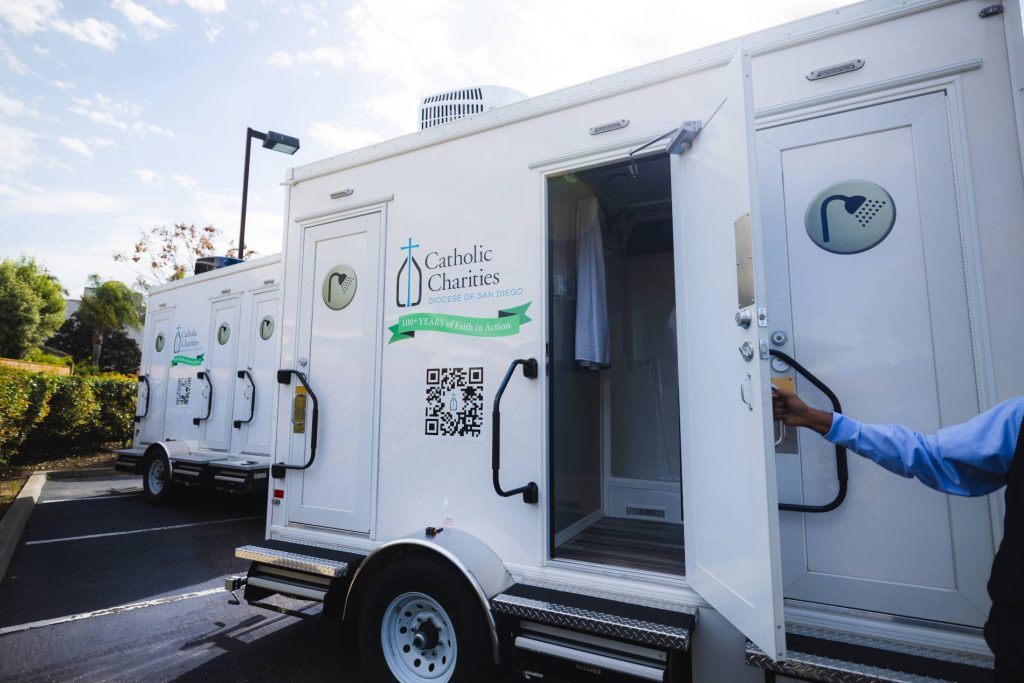SAN DIEGO — A hundred years ago, an influenza pandemic swept through communities great and small around the world. When it was over, the Spanish flu had killed about 50 million worldwide, some 675,000 in this country.
The U.S. Catholic Church formed a central organization to meet the needs of the poor in the wake of that catastrophe, particularly of widows and orphans. That’s how Catholic Charities organizations were born on the West Coast, including San Diego’s.
Today, another pandemic is sweeping the world, killing more than 2,000 people a day in the U.S. alone, as of late April.
Once more, Catholic Charities is putting faith in action, helping the most vulnerable in San Diego and Imperial counties.
“We’re stepping up to help our neighbors hurt by a new virus,” said the organization’s executive director, “Vino” Pajanor. “It’s what we do. It’s in our DNA.”
The agency launched the Emergency Food Distribution Network on April 6, just 18 days after Gov. Gavin Newsom ordered all but essential workers to stay at home to slow the deadly march of COVID-19.
The network is composed of 21 parishes in San Diego and Imperial counties that distribute food to low-income families and homebound individuals who register with Catholic Charities requesting assistance during the health crisis.
Once a week, staff members and volunteers at the parishes hand out packages of non-perishable food items to people in their cars who drive-through. Volunteers deliver them to the doorstep of those unable to leave their homes.
The director said the need for this assistance was apparent since the first week of the distribution, when the parishes served a total of 2,500 households. The next week, they served about 5,000, with that number surging to 10,000 by the fourth week.
“The demand is growing by the day,” he said. The director expects that the parishes will have provided food packages to at least 30,000 households by the first week of May.
He cites two other numbers to illustrate the Catholic community’s response to the health crisis. A total of 519 volunteers helped in some aspect of the food distribution the first week, putting in 946 hours. All work on this program is done in compliance with COVID-19 requirements, such as physical distancing, he added.
Father Edmundo Zárate leads two parishes, St. Jude Shrine of the West in San Diego and St. Anthony de Padua in National City. He said he agreed for both to participate in the program to distribute food given the need he sees in the community every day.
“Many people have lost their jobs or have seen their hours cut,” he said. “Nobody should suffer hunger.”
Some people may be embarrassed to admit that they need help, and be reluctant to reach out, he said.
“We’re all part of one family, the family of God,” he said. “And we need to help each other.”
The food comes from Feeding San Diego, the region’s leading hunger-relief and food rescue organization. Once a week, that organization drops off the food in pallets at Cathedral Catholic High School, another network partner. Volunteers and staff go there to pick up their allotment, returning to their parishes to prepare the packages for distribution. In the Imperial Valley, the food is distributed from Catholic Charities’ Food Resource Center in El Centro.
Initially, Catholic Charities planned for the food distribution to last through May 4, the date the stay-at-home directive was to be lifted. State and county health authorities, however, warn that the directive could remain in place weeks longer until key milestones are reached.
Every day brings more news about the devastating economic impact the shutdown is having on individuals and families whose situation was precarious in regular times.
“We see a long-term need for emergency food distribution in our region,” the director said.
In a different project, Catholic Charities received boxes of produce from the Sprouts markets in Chula Vista and Eastlake on April 14 that it used for its shelters for homeless men and women. The shelters are having to provide significantly more meals since their residents are having to shelter in place. Pajanor credited Chula Vista Mayor Mary Casillas Salas for bringing the organization together with the market chain.
Like it has for a century, he said that Catholic Charities provides more than a service to the most vulnerable.
“When there is fear in the world, and people lose all hope, we give them hope. We give them courage. We tell them that we will work together for a better tomorrow.”
Low-income families and homebound individuals facing hunger during the COVID-19 crisis may request a food package from the Emergency Food Distribution Network by calling (619) 323-2841 or through the page ccdsd.org/efdn.









